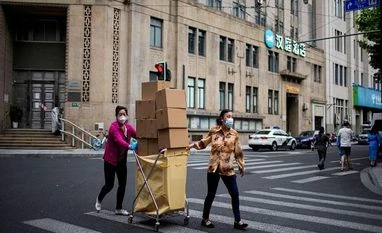Chinese authorities are facing an uphill battle convincing companies and households to boost borrowing as long as Covid outbreaks and lockdowns continue to crush confidence.
After loan growth weakened in April to the worst level in almost five years, several indicators suggest the data for May won’t be much better. Housing sales have continued to slump, indicating a lack of appetite for mortgages and subdued credit demand among real estate firms. Struggling to find enough clients, banks have been swapping bills with each other just so they can meet regulatory requirements for corporate lending.
The reluctance to borrow stems in large part from uncertainty over China’s Covid curbs, and whether future outbreaks could lead to repeated lockdowns like the one that crippled activity in Shanghai for weeks. Businesses have had to halt production and cut jobs, revenue has slumped and profits have plunged. Many companies are putting expansion plans on hold.
“The sluggish credit demand points to worsening expectations among market entities and slowing business expansion,” said Xing Zhaopeng, senior China strategist at Australia & New Zealand Banking Group Ltd. That suggests China’s economic rebound might be weak even in the third quarter, as many investment activities can only start after loans are secured.
The scenario is a challenging one for policy makers, who are pushing banks to lend more. The People’s Bank of China told lenders last week to “go all out” in increasing loans. It’s also pushed banks to lower mortgage rates and called on them to stabilize lending in the property sector.
The upshot is that the financial system is awash with cash, and any monetary easing from the central bank -- such as interest rate cuts and liquidity injections -- will likely prove less effective in spurring growth in the economy.
Here are four charts that show credit demand in China likely remained weak in May, even as Covid outbreaks began to wane and cities started to reopen.
Bank Rates
Falling rates on a type of short-term interbank loan is one sign that banks aren’t lending much to corporates.
The interest rate on transferring bankers’ acceptances maturing in one month fell to 0.01% early last week. That’s the fourth time since December that the rate approached zero toward the end of the month, according to data from the Shanghai Commercial Paper Exchange.
Purchases of the bills are counted as loans to companies. A rate near-zero means buying banks are asking for almost no discounts on those purchases, as they try to meet regulators’ requirements to lend more even as firms won’t borrow.
“The near-zero interest rate shows the imbalance between credit supply and demand remains outstanding,” said Wang Yifeng, chief banking analyst at Everbright Securities Co.
Corporate Debt
Companies aren’t interested in selling debt, either. The amount of onshore corporate bonds issued is set to fall behind the value of maturity for the first time in seven months in May, by 102 billion yuan ($15.3 billion), according to Bloomberg-compiled data. That means more debt was repaid than borrowed.
The contraction came even as costs fell. Earlier this month, the spread on three-year, AA rated onshore corporate bonds to government bonds hit the narrowest since 2007, Bloomberg-compiled figures show.
Property Slump
Authorities have taken more concerted steps to spur borrowing in the property market. The PBOC cut mortgage rates by a record this month and banks reduced their five-year lending rate, resulting in a reduction in home loan rates of as much as 35 basis points. Authorities have also said they would support reasonable housing needs, and more cities are easing curbs on home purchases by lowering mortgage rates, allowing people from other cities to buy homes or taking other approaches.
Yet consumers are cautious about adding leverage. Sales of residential properties in 50 key cities tracked by China Real Estate Information Corp. totaled 131.5 billion yuan in the first two weeks of May, down 64% from a year ago. The slump indicates mortgage figures likely remained weak in May after falling in April, dragging down medium- and long-term household loans.
“Housing demand is hard to boost immediately,” CRIC analysts including Yang Kewei wrote in a May report.
“Buyers are unsure whether developers can deliver the projects on schedule, whether home prices will drop, and if they’ll be able to continue repaying mortgages,” the analysts wrote. “The resurgence of the outbreak has dampened residents’ expectations of stable income.”
Flush Liquidity
The banking system is brimming with cash. The overnight repurchase rate -- a main gauge of interbank borrowing costs -- has stayed under 2% for more than two months, the longest stretch in two years.
The central bank and banking regulator last week ratcheted up their calls for lenders to boost loans, telling big financial institutions to “shoulder their responsibilities, make use of all resources to effectively connect with credit demand and strengthen policy transmission.”
Wang of Everbright Securities said that may have pushed those institutions -- particularly big state-owned banks and policy lenders -- to accelerate lending in the final week of May.
“Let’s wait and see how the loan figures will play out for the whole month,” he said.
Unlock 30+ premium stories daily hand-picked by our editors, across devices on browser and app.
Pick your 5 favourite companies, get a daily email with all news updates on them.
Full access to our intuitive epaper - clip, save, share articles from any device; newspaper archives from 2006.
Preferential invites to Business Standard events.
Curated newsletters on markets, personal finance, policy & politics, start-ups, technology, and more.
)